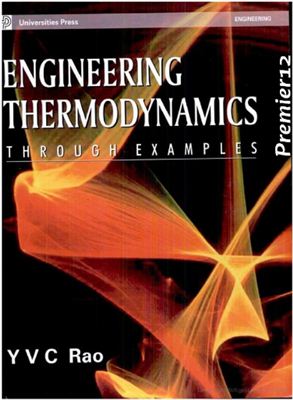Universities Press, 2003. 701 p. ISBN: 8173714231
Basic Concepts / Zeroth Law of Thermodynamics / Properties of Simple Compressible Fluids / First Law of Thermodynamics and its Application / Second Law of Thermodynamics / Thermodynamic Potentials and Availability / Thermodynamic Relations / Power and Refrigeration Cycles / Non-reacting Gas Mixtures and Psychrometry / Combustion and Chemical Thermodynamics / Appendices / Nomenclature / Index
This book presents the basic concepts, principles and applications of the principles in analyzing real life problems in an interactive manner. The book covers the syllabus of all universities and engineering colleges and can be used as a primary text or a supplement to any text book on thermodynamics for undergraduate students of all branches of engineering. It can also be used as a reference book by graduate students and practicing engineers. Psychrometry and chemical thermodynamics, Jacobian method of deriving thermodynamic relations in addition to the conventional partial differentials method are presented and illustrated through several examples. Sufficient thermodynamic property data tables are appended.
Basic Concepts / Zeroth Law of Thermodynamics / Properties of Simple Compressible Fluids / First Law of Thermodynamics and its Application / Second Law of Thermodynamics / Thermodynamic Potentials and Availability / Thermodynamic Relations / Power and Refrigeration Cycles / Non-reacting Gas Mixtures and Psychrometry / Combustion and Chemical Thermodynamics / Appendices / Nomenclature / Index
This book presents the basic concepts, principles and applications of the principles in analyzing real life problems in an interactive manner. The book covers the syllabus of all universities and engineering colleges and can be used as a primary text or a supplement to any text book on thermodynamics for undergraduate students of all branches of engineering. It can also be used as a reference book by graduate students and practicing engineers. Psychrometry and chemical thermodynamics, Jacobian method of deriving thermodynamic relations in addition to the conventional partial differentials method are presented and illustrated through several examples. Sufficient thermodynamic property data tables are appended.

